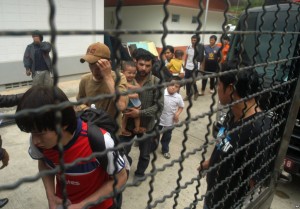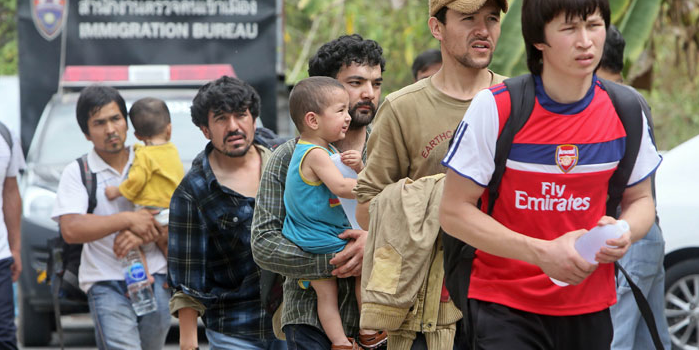BEIJING — The Thai authorities said Tuesday that they were searching for about 120 ethnic Uighurs who fled China and were detained in southern Thailand by the police earlier this year but escaped this month from a shelter there.
The escapees, almost all women and children, left the shelter in several separate groups this month; 21 have been found, leaving an additional 120 or so at large, said Maj. Gen. Puthishart Aekkashal, deputy police chief of a region in Songkhla Province, where the migrants were initially detained in March. At the time, the authorities took into custody 198 Uighurs who had entered Thailand voluntarily, the officer said.
“We’re not controlling them,” he said. “Sometimes they just walk out of the shelter. And when they are returned there, they try to walk out again.”
 The Uighurs are a mostly Muslim Turkic-speaking people who inhabit the western Chinese region of Xinjiang and are often resistant to rule by the Han, the dominant ethnicity in China. Ethnic violence in the region has resulted in hundreds of deaths this year.
The Uighurs are a mostly Muslim Turkic-speaking people who inhabit the western Chinese region of Xinjiang and are often resistant to rule by the Han, the dominant ethnicity in China. Ethnic violence in the region has resulted in hundreds of deaths this year.
The Uighurs who have been detained in Thailand claim they are Turks and should not be sent back to China. Chinese diplomats have been visiting the detainees and trying to persuade them to return to China, but the Uighurs have continued to insist they are Turks and to ask to be sent to Turkey or Malaysia, the deputy police chief said.
At the same time, human rights advocacy groups, including Human Rights Watch, have been urging Thai officials not to send the Uighurs back to China over fears that the Uighurs will be punished for trying to escape.
Turkey has also been sending officials to meet with the Uighurs. A police chief overseeing immigration issues in Songkhla, Thatchai Pitaneelaboot, said Thai officials were awaiting word from the Turkish Embassy on the nationality of the detainees. But he said employees of the embassy had not visited the detention center recently. “Their staff haven’t contacted us for many months,” he said.
“We want to finish the case soon,” he added. “We hope that the embassy will complete the process quickly.”
Last week, a Thai newspaper, Khao Sod, reported that a total of 146 Uighurs had escaped from the detention center on eight separate occasions.
On Friday, a spokesman for the Chinese Foreign Ministry was asked at a regularly scheduled news conference in Beijing about whether China would try to repatriate the Uighurs.
 “The Chinese side opposes illegal immigration and believes that this kind of criminal activity disrupts normal immigration and personnel exchanges among countries and violates the common interests of the international community,” said Hong Lei, the spokesman. “We are ready to enhance cooperation with the international community, including Thailand, to jointly crack down on the criminal activity of illegal immigration and to safeguard the security and stability of all countries and of the region.”
“The Chinese side opposes illegal immigration and believes that this kind of criminal activity disrupts normal immigration and personnel exchanges among countries and violates the common interests of the international community,” said Hong Lei, the spokesman. “We are ready to enhance cooperation with the international community, including Thailand, to jointly crack down on the criminal activity of illegal immigration and to safeguard the security and stability of all countries and of the region.”
In March, Thai officials detained 409 Uighurs in multiple locations in Thailand. One group of 112 who had been detained near the Cambodian border were taken to a center in Bangkok. Other groups were kept in Songkhla.
Continue reading the main storyContinue reading the main story
A report on Monday by Radio Free Asia, which is financed by the United States government, put the number of recent Uighur escapees from detention in Thailand at more than 100. The report said the escapees were part of a group of more than 300 who were taken into custody together after officials stumbled across them at a rubber plantation in Songkhla in March. Earlier reports said that that group had about 220 members.
The report last week said 170 women and children were put into a shelter together in Songkhla, while the men were held at other immigration detention centers. A woman who escaped the shelter told Radio Free Asia, which has Uighur-speaking journalists, that “life is so hard” at the shelter. She said the food was bad and portions were reduced each day. Chinese officials would visit the shelter and threaten the Uighurs with returning them to China, she said.
“We decided that instead of returning to China and risking our lives, we would escape,” she said. Of those who fled, only five or six were men, she added.
“We climbed over the walls and sneaked out the door,” she said, according to the report. “Nobody, no country, is showing an interest in our situation or is concerned about us, so if we were deported to China, they would eat us alive.”

Leave a Reply